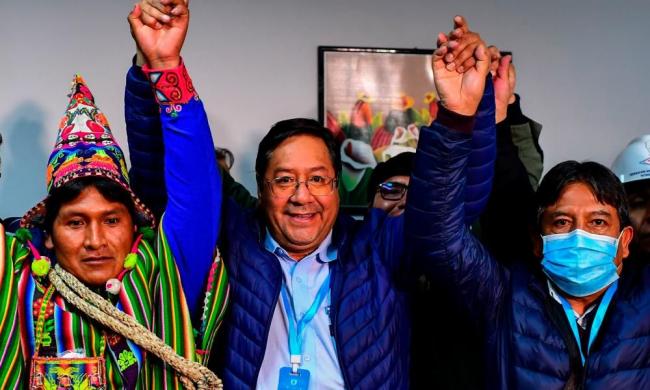Articles Menu

19 Oct 2020
Evo Morales’s leftwing party is celebrating a stunning political comeback after its candidate appeared to trounce rivals in Bolivia’s presidential election.
The official results of Sunday’s twice-postponed election had yet to be announced on Monday afternoon, but exit polls projected that Luis Arce, the candidate for Morales’s Movimiento al Socialismo (Mas), had secured more than 50% of the vote while his closest rival, the centrist former president Carlos Mesa, received about 30%.
Mesa conceded defeat on Monday lunchtime, telling supporters that a quick count showed a “very convincing and very clear” result. “There is a large gap between the first-placed candidate and us … and, as believers in democracy, it now falls to us … to recognise that there is a winner in this election,” Mesa said
Arce, a former finance minister under Morales, had earlier claimed victory in a late-night broadcast from La Paz. “We have reclaimed democracy and above all we have reclaimed hope,” said the 57-year-old UK-educated economist, who is widely known as Lucho.
Arce vowed to end the uncertainty that has plagued his bitterly divided nation since October 2019, when hotly disputed claims of vote rigging against his party resulted in mass street protests, the presidential election being scrapped and Morales being forced from the country by security forces in what his supporters call a racist, rightwing coup.
“We will govern for all Bolivians … we will bring unity to our country,” said Arce, who should be sworn in as president in the first half of November.
Fireworks echoed around La Paz as news of the forecast victory spread, although a Mas spokeswoman called on Arce’s supporters to await the official result. “We know there are high expectations but we must comply with the rules in order to have a good celebration,” said Marianela Paco.
Morales, who has towered over the election rerun despite living in exile in Argentina, hailed “a resounding victory” for his party. “Sisters and brothers: the will of the people has prevailed,” tweeted Bolivia’s first indigenous president, a key member of Latin America’s leftwing pink tide who governed from 2006 until his dramatic downfall last year.
Even Morales’s nemesis, the rightwing interim president, Jeanine Áñez, conceded that the left had come out on top. “We do not yet have the official count, but the data we do have shows that Mr Arce [has] … won the election. I congratulate the winners and ask them to govern thinking of Bolivia and of democracy,” Áñez tweeted
Leading members of the Latin American left, who hope Arce’s apparent triumph may help revive their fortunes, celebrated the result. “Viva the Bolivian people! Viva democracy!” tweeted Gleisi Hoffmann, the president of the Brazilian Workers’ party (PT).
Venezuela’s authoritarian leader, Nicolás Maduro, tweeted: “A great victory! United and aware, the Bolivian people have used votes to defeat the coup they carried out against our brother Evo.”
If confirmed, the victory would represent a sensational political fightback for Mas, which was left reeling last year when its leader was forced to flee the country after trying to secure an unprecedented fourth term as president.
“It’s a return to the kind of mandate they had when Evo was first elected in 2005,” said Jim Shultz, the founder of the Bolivia-focused Democracy Centre.
For Áñez’s outgoing conservative interim government, which took power after Morales’s banishment, it was a stinging rebuke. “It tells us that the rightwing in Bolivia has no broad political support – not even close,” Shultz said. “The rightwing was given a chance to govern and proved that it is only interested in its own power and in itself and has contempt for the indigenous and poor of the country. They demonstrated that by pretending they had legitimacy that they didn’t, by overseeing real human rights abuses and impunity, and by being incompetent and corrupt in their governance. And people weren’t going to have it.”
One exit poll suggested Arce had achieved a thumping victory, winning a majority in five of Bolivia’s nine departments. The poll said Arce secured more than 65% of the vote in La Paz, 63% in Cochabamba, 62% in Oruro and 51% in Potosí.
It may be several days before the official result is confirmed. On Monday afternoon electoral authorities said that with nearly 20% of votes counted, 36% had gone to Arce and nearly 43% to Mesa.
In Washington, a state department spokesperson said: “We are awaiting the official results, but President Trump and the United States look forward to working with whomever the Bolivians elect. We will continue to promote democracy, human rights and prosperity in Bolivia and throughout the region.”
Opponents of Mas claim Arce is little more than a puppet for Bolivia’s exiled former president, who they suspect will now seek to return home. But Arce sought to publicly distance himself from Morales during the campaign, and on Monday allies said the man poised to become Bolivia’s next president was beholden to no one.
“Categorically, Evo will not interfere in the government of brother Luis Arce,” said David Apaza, a Mas leader in El Alto, a high plateau city above La Paz. “Comrade Evo Morales in his time was the vital element, the principal protagonist ... [But] now we believe our comrade should rest, while brother Luis Arce takes the lead.”
[Top photo: Luis Arce, centre, celebrates with his running mate, David Choquehuanca, right, on Monday. Photograph: Ronaldo Schemidt/AFP/Getty Images]